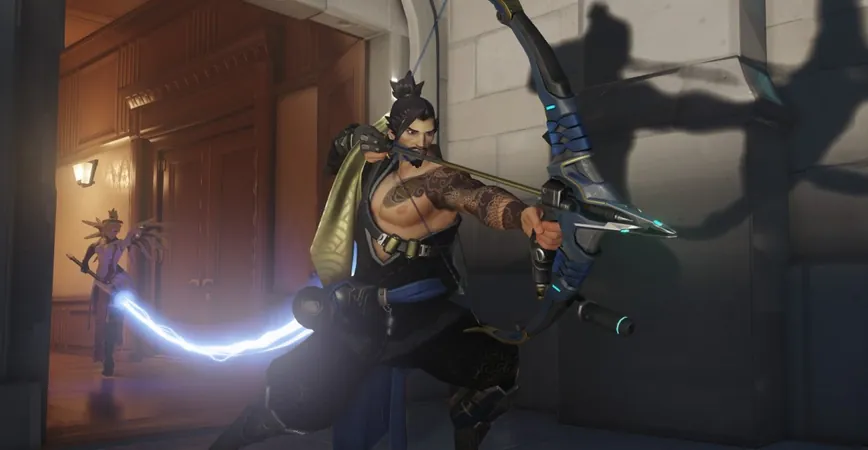
The Untold Saga of Blizzard's Failed MMO Titan: What Really Went Wrong?
2024-10-02
Author: Ying
Introduction
In a shocking revelation in 2014, Blizzard Entertainment announced the cancellation of its highly anticipated MMO project, Titan—a successor to its blockbuster hit, World of Warcraft. Just weeks later, the tech world learned that Blizzard was pivoting to Overwatch, a hero shooter that emerged from Titan's discarded concepts and ideas.
Background and Ambition
Fast forward nearly a decade, and Overwatch has solidified its place as a cornerstone of Blizzard's portfolio, attracting millions of players worldwide. However, as fans reminisce about the what-ifs, a deep dive into the backstory of Titan reveals a tangled web of ambition, mismanagement, and missed opportunities, as outlined in a forthcoming book by Bloomberg’s Jason Schreier titled Play Nice: The Rise, Fall, and Future of Blizzard Entertainment.
Back in 2006, video game enthusiasts were buzzing about the "World of Warcraft killer," a game that could dethrone the reigning champion. As Blizzard executives believed that such a game would inevitably emerge, they decided to take the fight to their competitors by crafting their own. Initially considering a World of StarCraft, the team opted instead to create an entirely new universe.
The Creative Dream Team
Led by Blizzard veterans Chris Metzen, Shane Dabiri, and Justin Thavirat, the Titan team embarked on a grand vision—an MMORPG that would combine superhero-like characters with mundane civilian lives. Picture this: a player fretting over a perfectly cooked dish as they dash off on a secret mission to combat lurking evil. The premise certainly had potential.
The Rise of Challenges
Yet, as Titan progressed, challenges mounted. Team 4, Blizzard’s dream team of developers, began building an overwhelming number of prototypes, from fishing to gardening, trying to create a compelling user experience. Unfortunately, these efforts seemed futile, as the core gameplay loop—the heart of what would keep players engaged—remained elusive. Regular brainstorming sessions turned into endless cycles of revisions, stuck in a perpetual state of creative déjà vu.
Gameplay and Competition
While the combat aspect was more defined, it presented its own dilemmas. Players could choose from various superhero classes for battles against foes or each other, but sustaining player engagement over time proved difficult. Over time, Blizzard found itself fending off competition from rising developers like Riot Games, which aggressively recruited talent, compromising the team's strength.
Technological Limitations
Moreover, technological limitations hampered Team 4’s creativity. The bespoke technology designed for Titan was often inadequate, leading to inefficiencies and hindering progress. The video game landscape had drastically changed since the days of simpler titles like Warcraft, with increased complexity and larger teams creating new challenges that Blizzard had to navigate.
The Turning Point
A turning point occurred in the spring of 2013 when Blizzard executives admitted that Titan needed a reboot, a decision met with mixed emotions by the team. While some felt relief at the prospect of pivoting away from a troubled project, others mourned the years of hard work lost. Ultimately, Titan's financial toll was around $80 million, a staggering sum that highlighted the risks taken by the company.
Aftermath and Lessons Learned
Titan's cancellation led to the resurrection of much of its content in Overwatch, which became a massive success, reshaping the competitive gaming landscape. However, the fallout from Titan’s demise extended beyond the game itself. Rob Pardo, a titan of Blizzard, faced backlash and scrutiny for his oversight of the troubled project, questioning his role as a leader. This culminated in a departure from the company that once celebrated him as a key architect of its success.
With Titan now a cautionary tale instead of a blockbuster, industry veterans and newcomers alike reflect on a crucial lesson: even an established giant like Blizzard isn’t immune to project failures. The Titan saga opens the door to discussions about creative vision, team dynamics, and the pressures of living up to monumental expectations in the ever-evolving gaming realm.
Conclusion
What could have been achieved had Titan succeeded is an unanswered question that continues to intrigue fans and developers alike. Could Blizzard's next big idea emerge from the ashes of this ambitious failure? Only time will tell.

 Brasil (PT)
Brasil (PT)
 Canada (EN)
Canada (EN)
 Chile (ES)
Chile (ES)
 España (ES)
España (ES)
 France (FR)
France (FR)
 Hong Kong (EN)
Hong Kong (EN)
 Italia (IT)
Italia (IT)
 日本 (JA)
日本 (JA)
 Magyarország (HU)
Magyarország (HU)
 Norge (NO)
Norge (NO)
 Polska (PL)
Polska (PL)
 Schweiz (DE)
Schweiz (DE)
 Singapore (EN)
Singapore (EN)
 Sverige (SV)
Sverige (SV)
 Suomi (FI)
Suomi (FI)
 Türkiye (TR)
Türkiye (TR)